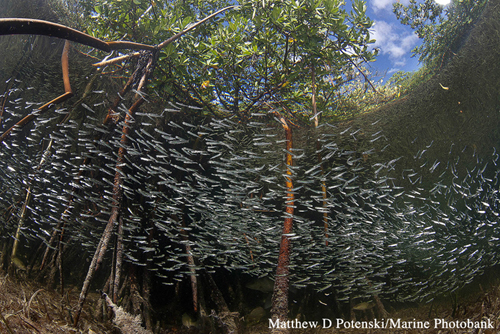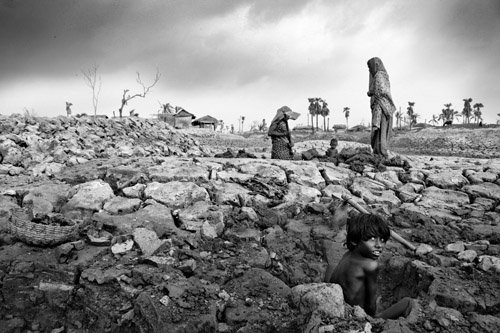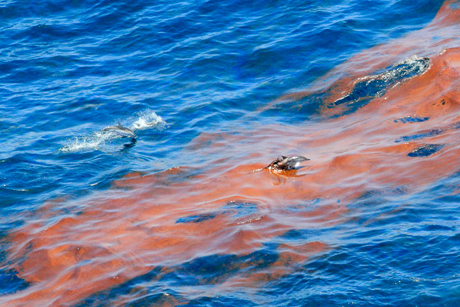Navigation
"Ocean In Focus" Photography Contest to Advance Ocean Conservation: Finalists Announced
SeaWeb, an international non-profit ocean conservation organization, announced the six finalists of the Marine Photobank’s fifth annual “Ocean In Focus” photography contest on 12 March 2013. The contest aims to illuminate the human-ocean connection and advance ocean conservation through photography.
 A baitfish shoal in the Bahamas, ready to retreat to the protection of the mangroves at the first sign of a predator: The photograph of a healthy coastal ecosystem. Ocean in Focus contest continues to uncover the unsavory truths facing the ocean. Photograph by Matthew Potenski Courtesy of Marine Photobank
A baitfish shoal in the Bahamas, ready to retreat to the protection of the mangroves at the first sign of a predator: The photograph of a healthy coastal ecosystem. Ocean in Focus contest continues to uncover the unsavory truths facing the ocean. Photograph by Matthew Potenski Courtesy of Marine Photobank
On March 12, 2013, SeaWeb, an international non-profit ocean conservation organization, announced the six finalists of the Marine Photobank’s fifth annual Ocean In Focus photography contest. The images tell stories of peril, passion and perseverance in the ocean and coastal communities. The contest aims to illuminate the human-ocean connection and advance ocean conservation through photography.
 Climate change, and the increase in frequency and intensity of natural disasters, brings real consequences to the human: populations living in coastal communities.Mohammad Rakibul Hasan captures the desperation in his photograph featuring a young girl who is digging deep into soil saturated with salt water, hoping to find logs to burn as fuel. Two years after Cyclone Aila, the communities along Bangladesh’s southwest coastline are starting to rebuild their lives. Photograph by Mohammad Rakibul Hasan Courtesy of Marine Photobank
Climate change, and the increase in frequency and intensity of natural disasters, brings real consequences to the human: populations living in coastal communities.Mohammad Rakibul Hasan captures the desperation in his photograph featuring a young girl who is digging deep into soil saturated with salt water, hoping to find logs to burn as fuel. Two years after Cyclone Aila, the communities along Bangladesh’s southwest coastline are starting to rebuild their lives. Photograph by Mohammad Rakibul Hasan Courtesy of Marine Photobank
“The photo contest receives hundreds of compelling images showing the true nature of human activity on a fragile ocean and coastal ecosystems,” said Devin Harvey, Marine Photobank Manager.
A panel of judges who are experts in their respective fields chose the finalists.
“These six finalists really get to the core of the human-ocean connection with their photos and tell an incredible story – even without words. We look forward to reading the real stories behind the images and sharing them with our audiences.”
The next phase of the contest will include a written essay by each finalist describing how their image displays the issues that our ocean is currently facing. The finalists are now invited to dive deeper into the images they have captured to bring us behind the lens, and, in some cases, under the surface of the sea, with an essay component.
 The Gulf of Mexico and its diverse ecosystems and coastal communities continue to feel the impacts of the 2010 oil spill: disaster. Ron Wooten’s photograph shows an Atlantic Striped Dolphin and other members of a pod of more than 100 animals diving into and emerging from long lines of oil ‘mousse.’ The full impacts of the spill on the ecosystem and animals, like the dolphins in Wooten’s photo, are still being studied. Photograph by Ron Wooten Courtesy of Marine Photobank
The Gulf of Mexico and its diverse ecosystems and coastal communities continue to feel the impacts of the 2010 oil spill: disaster. Ron Wooten’s photograph shows an Atlantic Striped Dolphin and other members of a pod of more than 100 animals diving into and emerging from long lines of oil ‘mousse.’ The full impacts of the spill on the ecosystem and animals, like the dolphins in Wooten’s photo, are still being studied. Photograph by Ron Wooten Courtesy of Marine Photobank
The other finalists are
Andy Murch, Alex Hofford, and Viora Alessio.
Their photographs and the ones included in this article can be seen on the
Marine Photobank Web site at
http://www.marinephotobank.org/resources/OIFcontestwinners2012slideshow.php,
and on
Horizon International’s ocean and coral reef Web Site, Magic Porthole, at
www.magicporthole.org and www.coralreefs.co.
All photos contributed to the Marine Photobank are available for download for non-commercial use by its membership of teachers, students, researchers, conservationists, scientists and others as well as print and Web journalists under specified.
Finalists win a copy of Callum Roberts’ book, The Ocean of Life. The Photographer of the image voted best overall will also win a Solio Classic Solar Hybrid Charger, donated by Q-Cell.
The grand prize winner will be rewarded with a trip for two aboard the National Geographic Endeavour for a 10-day expedition to the Galápagos Islands courtesy of Lindblad Expeditions.
This news is from SeaWeb, 12 March 2013.
Search
Latest articles
Agriculture
- World Water Week: Healthy ecosystems essential to human health: from coronavirus to malnutrition Online session Wednesday 24 August 17:00-18:20
- World Water Week: Healthy ecosystems essential to human health: from coronavirus to malnutrition Online session Wednesday 24 August 17:00-18:20
Air Pollution
- "Water and Sanitation-Related Diseases and the Changing Environment: Challenges, Interventions, and Preventive Measures" Volume 2 Is Now Available
- Global Innovation Exchange Co-Created by Horizon International, USAID, Bill and Melinda Gates Foundation and Others
Biodiversity
- It is time for international mobilization against climate change
- World Water Week: Healthy ecosystems essential to human health: from coronavirus to malnutrition Online session Wednesday 24 August 17:00-18:20
Desertification
- World Water Week: Healthy ecosystems essential to human health: from coronavirus to malnutrition Online session Wednesday 24 August 17:00-18:20
- UN Food Systems Summit Receives Over 1,200 Ideas to Help Meet Sustainable Development Goals
Endangered Species
- Mangrove Action Project Collaborates to Restore and Preserve Mangrove Ecosystems
- Coral Research in Palau offers a “Glimmer of Hope”
Energy
- Global Innovation Exchange Co-Created by Horizon International, USAID, Bill and Melinda Gates Foundation and Others
- Wildlife Preservation in Southeast Nova Scotia
Exhibits
- Global Innovation Exchange Co-Created by Horizon International, USAID, Bill and Melinda Gates Foundation and Others
- Coral Reefs
Forests
- NASA Satellites Reveal Major Shifts in Global Freshwater Updated June 2020
- Global Innovation Exchange Co-Created by Horizon International, USAID, Bill and Melinda Gates Foundation and Others
Global Climate Change
- It is time for international mobilization against climate change
- It is time for international mobilization against climate change
Global Health
- World Water Week: Healthy ecosystems essential to human health: from coronavirus to malnutrition Online session Wednesday 24 August 17:00-18:20
- More than 400 schoolgirls, family and teachers rescued from Afghanistan by small coalition
Industry
- "Water and Sanitation-Related Diseases and the Changing Environment: Challenges, Interventions, and Preventive Measures" Volume 2 Is Now Available
- Global Innovation Exchange Co-Created by Horizon International, USAID, Bill and Melinda Gates Foundation and Others
Natural Disaster Relief
- STOP ATTACKS ON HEALTH CARE IN UKRAINE
- Global Innovation Exchange Co-Created by Horizon International, USAID, Bill and Melinda Gates Foundation and Others
News and Special Reports
- World Water Week: Healthy ecosystems essential to human health: from coronavirus to malnutrition Online session Wednesday 24 August 17:00-18:20
- STOP ATTACKS ON HEALTH CARE IN UKRAINE
Oceans, Coral Reefs
- World Water Week: Healthy ecosystems essential to human health: from coronavirus to malnutrition Online session Wednesday 24 August 17:00-18:20
- Mangrove Action Project Collaborates to Restore and Preserve Mangrove Ecosystems
Pollution
- Zakaria Ouedraogo of Burkina Faso Produces Film “Nzoue Fiyen: Water Not Drinkable”
- "Water and Sanitation-Related Diseases and the Changing Environment: Challenges, Interventions, and Preventive Measures" Volume 2 Is Now Available
Population
- "Water and Sanitation-Related Diseases and the Changing Environment: Challenges, Interventions, and Preventive Measures" Volume 2 Is Now Available
- "Water and Sanitation-Related Diseases and the Changing Environment: Challenges, Interventions, and Preventive Measures" Volume 2 Is Now Available
Public Health
- Honouring the visionary behind India’s sanitation revolution
- Honouring the visionary behind India’s sanitation revolution
Rivers
- World Water Week: Healthy ecosystems essential to human health: from coronavirus to malnutrition Online session Wednesday 24 August 17:00-18:20
- Mangrove Action Project Collaborates to Restore and Preserve Mangrove Ecosystems
Sanitation
- Honouring the visionary behind India’s sanitation revolution
- Honouring the visionary behind India’s sanitation revolution
Toxic Chemicals
- "Water and Sanitation-Related Diseases and the Changing Environment: Challenges, Interventions, and Preventive Measures" Volume 2 Is Now Available
- Actions to Prevent Polluted Drinking Water in the United States
Transportation
- "Water and Sanitation-Related Diseases and the Changing Environment: Challenges, Interventions, and Preventive Measures" Volume 2 Is Now Available
- Urbanization Provides Opportunities for Transition to a Green Economy, Says New Report
Waste Management
- Honouring the visionary behind India’s sanitation revolution
- Honouring the visionary behind India’s sanitation revolution
Water
- Honouring the visionary behind India’s sanitation revolution
- Honouring the visionary behind India’s sanitation revolution
Water and Sanitation
- Honouring the visionary behind India’s sanitation revolution
- Honouring the visionary behind India’s sanitation revolution

